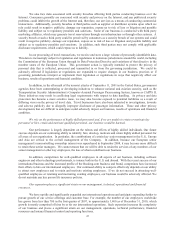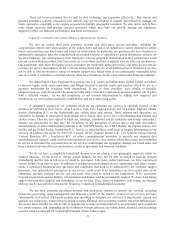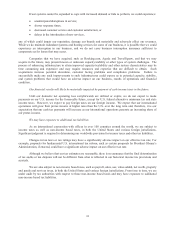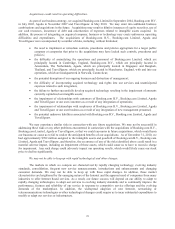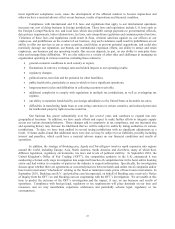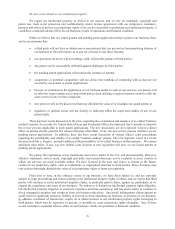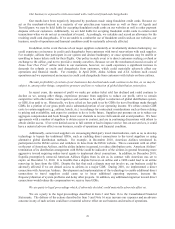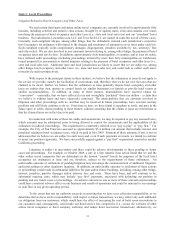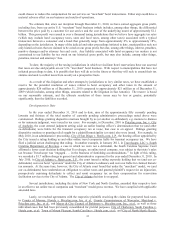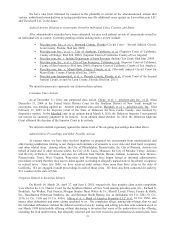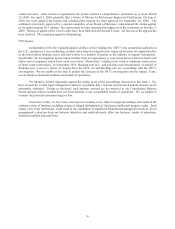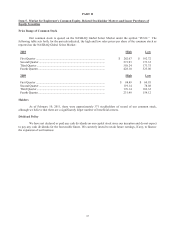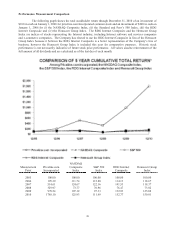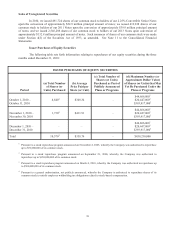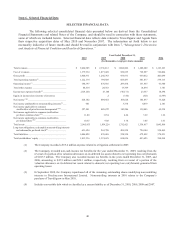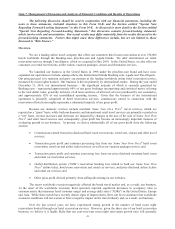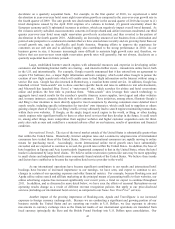Priceline 2010 Annual Report Download - page 106
Download and view the complete annual report
Please find page 106 of the 2010 Priceline annual report below. You can navigate through the pages in the report by either clicking on the pages listed below, or by using the keyword search tool below to find specific information within the annual report.
32
could choose to reduce the compensation for our services on “merchant” hotel transactions. Either step could have a
material adverse effect on our business and results of operations.
We estimate that, since our inception through December 31, 2010, we have earned aggregate gross profit,
including fees, from our entire U.S. “merchant” hotel business (which includes, among other things, the differential
between the price paid by a customer for our service and the cost of the underlying room) of approximately $1.1
billion. This gross profit was earned in over a thousand taxing jurisdictions that we believe have aggregate tax rates
(which may include hotel occupancy taxes, state and local taxes, among other taxes) associated with a typical
transaction between a consumer and a hotel that generally range from approximately 6% to approximately 18%,
depending on the jurisdiction. In many of the judicial and other proceedings initiated to date, municipalities seek not
only historical taxes that are claimed to be owed on our gross profit, but also, among other things, interest, penalties,
punitive damages and/or attorney fees and costs. Any liability associated with hotel occupancy tax matters is not
constrained to our liability for tax owed on our historical gross profit, but may also include, among other things,
penalties, interest and attorneys’ fees.
To date, the majority of the taxing jurisdictions in which we facilitate hotel reservations have not asserted
that taxes are due and payable on our U.S. “merchant” hotel business. With respect to municipalities that have not
initiated proceedings to date, it is possible that they will do so in the future or that they will seek to amend their tax
statutes and seek to collect taxes from us only on a prospective basis.
As a result of this litigation and other attempts by jurisdictions to levy similar taxes, we have established a
reserve for the potential resolution of issues related to hotel occupancy and other taxes in the amount of
approximately $26 million as of December 31, 2010 compared to approximately $21 million as of December 31,
2009 (which includes, among other things, amounts related to the litigation in San Antonio). The reserve is based
on our reasonable estimate, and the ultimate resolution of these issues may be less or greater, potentially
significantly, than the liabilities recorded.
Developments to Date
In the year ended December 31, 2010 and to date, nine of the approximately fifty currently pending
lawsuits and thirteen of the total number of currently pending administrative proceedings noted above were
commenced. Rulings granting dispositive motions brought by us (or another co-defendant), e.g. motions to dismiss
or for summary judgment, were issued in ten cases. For example, in December, 2010 in Priceline.com, Inc. v. City
of Anaheim, the court entered judgment setting aside an earlier hearing officer’s determination that we (and other
co-defendants) were liable for the transient occupancy tax at issue; that case is on appeal. Rulings granting
dispositive motions or granting relief sought by a plaintiff municipality (or state) also were issued. For example, in
May 2010, in an administrative proceeding, City of San Diego v. Hotels.com, L.P., the hearing officer appointed by
the City issued a ruling holding us and other online travel companies liable for transient occupancy tax. We have
filed a judicial action challenging that ruling. In another example, in January 2011, in Travelscape, LLC v. South
Carolina Department of Revenue, a case in which we were not a defendant, the South Carolina Supreme Court
affirmed a lower court decision holding that Travelscape, an online travel company, was subject to that state’s sales
tax because Travelscape was “engaged . . . in the business of furnishing accommodations.” In light of this ruling,
we recorded a $1.7 million charge to general and administrative expenses for the year ended December 31, 2010. In
July 2010, in City of Atlanta v. Hotels.com, L.P., the court issued a ruling expressly holding that we (and our co-
defendants) were not hotel “operators” under the City of Atlanta’s ordinance and were not liable for claimed historic
tax amounts. At the same time, however, the City of Atlanta court found that under the “merchant” model, we (and
our co-defendants) have undertaken an obligation to collect taxes and granted plaintiff’s request for an injunction,
prospectively enjoining defendants to collect and remit occupancy tax on their compensation for reservation
facilitation services to the City of Atlanta. The City of Atlanta decision is on appeal.
Several jurisdictions, including the states of New York and North Carolina, amended their respective laws
in an effort to tax online travel companies and “merchant” model gross revenue. We have complied with applicable
amended laws.
Lastly, we reached agreements with the respective plaintiffs resolving the claims for purported back taxes
in County of Monroe, Florida v. Priceline.com, Inc. et al., County Commissioners of Worcester, Maryland v.
Priceline.com, Inc., et al., and Mayor & City Council of Baltimore v. Priceline.com, Inc., et al., as well as three
individual cases that had been previously consolidated for pretrial purposes, City of Charleston, South Carolina v.
Hotels.com, et al.; Town of Mount Pleasant, South Carolina v. Hotels.com, et al.; and City of North Myrtle Beach,


